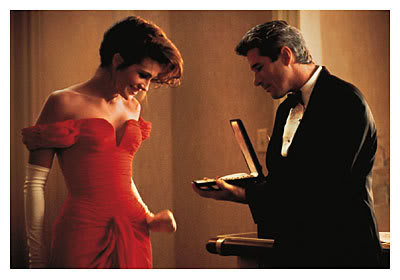Secrets of the Silver Screen: Irony
By Therese Walsh | September 25, 2006 |
 The Michael Hauge interview has definitely amped up my interest in secrets of successful screenwriters. One thing Kath and I have been chatting a little about is the logline or “one-line” as it’s sometimes called in Hollywood. This line is important whether you’re a screenwriter or a novelist, because when an agent or editor – or potential reader at a booksigning – asks you that inevitable question, “What’s your book about?” you want to have a snappy comeback that intrigues. During WU’s interview with Michael Hauge, I asked a lot about the one-line and how to be certain it conveys what the story is about. I was personally concerned about this because while I had a hooky one-line for my own manuscript—one that implied action and had a certain spooky promise to it—I knew that it didn’t really capture the emotional flavor of the women’s fiction story I’m writing. So I’ve been stumped.
The Michael Hauge interview has definitely amped up my interest in secrets of successful screenwriters. One thing Kath and I have been chatting a little about is the logline or “one-line” as it’s sometimes called in Hollywood. This line is important whether you’re a screenwriter or a novelist, because when an agent or editor – or potential reader at a booksigning – asks you that inevitable question, “What’s your book about?” you want to have a snappy comeback that intrigues. During WU’s interview with Michael Hauge, I asked a lot about the one-line and how to be certain it conveys what the story is about. I was personally concerned about this because while I had a hooky one-line for my own manuscript—one that implied action and had a certain spooky promise to it—I knew that it didn’t really capture the emotional flavor of the women’s fiction story I’m writing. So I’ve been stumped.
Until last night.
Last night, I read one of the opening tips from Blake Snyder’s Save the Cat! The Last Book on Screenwriting You’ll Ever Need. I bought this book after reading an article by Snyder on the importance of creating likable characters from the get-go. It’s essential, he said, because this will compel viewers (or readers) to ally with your character and root for them mentally throughout their journey. Let them save a cat, help a child, whatever; just get some kind of emotional hook into the first few beats of your story. I added this to my own story and loved what it did to my opening scene, so I figured if the book could bring me even one more tip as good as that one, it would’ve paid for itself.
I didn’t have to wait for long; right there on page 6 sat a new golden nugget, and it had to do with my dreaded one-line problem.
Says Snyder:
The number one thing a good logline must have, the single most important element, is: irony…And that goes for whether it’s a comedy or a drama.
A cop comes to L.A. to visit his estranged wife and her office building is taken over by terrorists – Die Hard
A businessman falls in love with a hooker he hires to be his date for the weekend – Pretty Woman
I don’t know about you, but I think both of these loglines, one from a drama, one from a romantic comedy, fairly reek of irony. And irony gets my attention. It’s what we who struggle with loglines like to call the hook, because that’s what it does. It hooks your interest.
So, book in hand, I think about it: Where’s the irony in my women’s fic story? I see it in a few places, but at the heart of it, when things really start to change, I detect a speck of promise. I grab my pencil, write on an endpaper (gasp, I know):
A woman purchases an ancient dagger at auction because it reminds her of her idyllic childhood, but the blade—with a will of its own—means to turn her around to face and fix her dysfunctional adulthood.
Bingo. Now the one-line sounds like my story is about a woman’s journey—because it is—but it also sounds like the tale has a touch of paranormal in it—and it does. It’s exactly the flavor I needed, thank you Mr. Snyder for saving my cat. Or my mind. Or something.
Having a hard time putting your finger on the pulse of your story? Worried about how to describe it to professionals in the biz? Think about where the irony lies and you may find yourself tipping a hat to Hollywood.
Write on, all! (And feel free to share your one-line if you’d like!)










you know you’ve nailed your logline when the person you are describing your story to, nods with enlightened understanding. thanks for the insight
Good post! The logline is kind of like the high concept.
Maybe Snyder discusses how high concept fits in on page 9; I’ll let you know! ;) I have high hopes for this book.
Irony: Incongruity between what might be expected and what actually occurs (definition via American Heritage Dictionary).
I think everyone is intrigued when they read something that starts out predictably, but then gets turned on its head. So finding the logline can really help a writer craft a good pitch….and a good story.
Lots of food for thought this week.
Great post, Therese! I usually stay away from daggers for that very reason. *g*
I’ll look up that book. It sounds interesting.